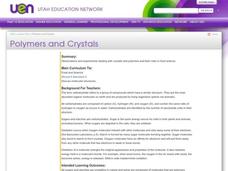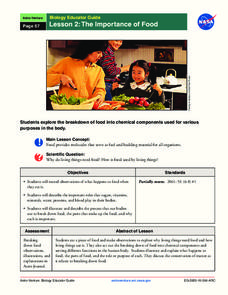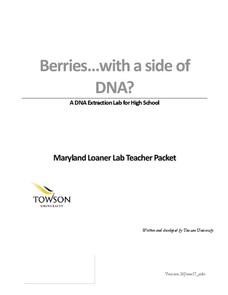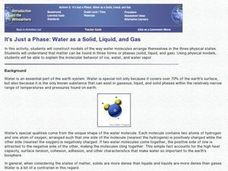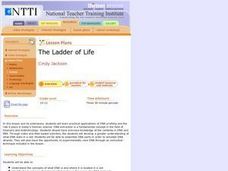Curated OER
Density: Floating, Sinking, and Suspending
Students observe teacher demonstrations that illustrate density. In this density lesson plan, the teacher demonstrates how air bubbles in a carbonated drink can cause a raisin to float and how an egg sinks in fresh water, but floats in...
Curated OER
Human Body Explorations
Students examine genetics and the DNA of a kiwi. For this DNA lesson students complete a lab to extract DNA and interpret their results.
Curated OER
Polymers and Crystals: Their Role in Food Science
Blend chemistry with cooking in this exploration of polymers, carbohydrates, and food science. Experimenting with gelatin produces concrete examples of the bonding and ploymerization discussed in the activity. Copious, comprehensive...
Teach Engineering
The Building Blocks of Matter
Everything can be reduced to atoms. The first installment of a six-part Mixtures and Solutions unit focuses on the building blocks of matter. Scholars review basic atomic structure, including protons, neutrons, and electrons, in...
Space Awareness
Let's Break the Particles
Build learning by breaking atoms! Young scientists study the way energy changes with a hands-on activity. As they roll steel marbles down a ramp, learners test the hypothesis that kinetic energy does not go away with friction...
Teach Engineering
Capillarity – Measuring Surface Tension
How do cohesion and adhesion work together? The third installment of a nine-part series teaches young scientists the difference between adhesion and cohesion. They also learn how cohesion and adhesion work together to cause capillary...
Teach Engineering
Restriction Enzymes and DNA Fingerprinting
Show your class why restrictions aren't always a bad thing. In the third segment of a four-part series, the instructor develops the idea of restriction enzymes. Pupils learn how scientists use restriction enzymes in DNA analysis and DNA...
Agriculture in the Classroom
Design 'Y'er Genes
How do changes in DNA affect an organism? Scholars explore chromosomes, genes, DNA, and mutations by modeling the DNA of a strawberry. They build a DNA model, then manipulate it to show how changing the genes transforms the strawberry...
SRI International
Science of Water
Water is crucial to survival. Scholars gain an appreciation for water by reading about it, learning about its atomic properties, and investigating its properties through six stations in a lab activity.
Curated OER
Testing Water Tension
Students explore and experiment with water to assess the cohesion and surface tension of water. They conduct comparative tests to study water molecules and then illustrate an insect taking advantage of water's surface tension.
Curated OER
Carboxylic Acids Worksheet
In this chemistry worksheet, students look for the completion of each compound while writing the formula and the molecule to go with it.
American Chemical Society
Changing State: Evaporation
Why do experiments require a control? Guide scholars through designing an experiment to see what they can do to evaporate water faster with a lesson that stresses the importance of controlling all variables. The second activity...
NASA
The Importance of Food
Pupils make observations while eating food. They act out the process of food breaking down in the body and the roles of various chemical components, such as sugar and protein. It concludes with an activity illustrating the process and a...
Virginia Department of Education
Matter and Energy: Equations and Formulas
Using simple materials, an informative instructional activity demonstrates the Law of Conservation of Matter and explains how to balance chemical equations. Young chemists perform experiments, analyze reactions, and balance...
Towson University
Berries...With a Side of DNA? (High School)
Is DNA still present after picking fruit or cooking vegetables? Biology scholars extract and collect DNA strands in an impactful lab. Working groups prepare their samples and compare their results to negative and positive standard...
Curated OER
Condensation Polymerization: Preparation of Two Types of Polyesters
College-level or AP chemists use phthalic anhydride to synthesize two different polyesters, one linear and one cross-linked in structure. A detailed materials list and well-written procedures are provided on a lab sheet. Learners write...
Baylor College
Moving Air
In lab groups, young scientists place aluminum cans with a bubble-solution cap into different temperatures of water to see what size of bubble dome forms. As part of an atmosphere unit in preparation for learning about convection...
Cornell University
Polymers: Instant Snow
Is it easy to make snow? Scholars use critical thinking skills as they investigate the concept of polymers by making snow. The class tests several different variables and takes measurements over the course of several days. They then...
Curated OER
What is Temperature?
Students examine how temperature is the measure of the average kinetic energy of the molecules of a substance.
Curated OER
Density
Students, in groups, design a procedure to calculate the mass of gas molecules in the classroom by measuring the volume of the classroom and researching the density of air. They apply changes in air density with altitude and effects on a...
Curated OER
Somethin' Sweet
Students make their own candy. In this science lesson plan, students observe how molecules interact with each other in physical changes and observe how the addition of heat can cause molecules to interact and form new molecules in...
Curated OER
Molecular Forces at Work: Creating Soap Bubbles
Students investigate adhesion, cohesion and surface tension. In this molecular forces lesson plan, students observe multiple demonstrations that show surface tension, the attraction of water molecules to each other and the ability of...
Curated OER
It's Just a Phase: Water as Solid, Liquid and Gas
Students construct models of the way water molecules arrange themselves in three physical states - solid, liquid, and gas. They explain the molecular behavior of ice, water, and water vapor.
Curated OER
The Ladder of Life
Students explain the concepts of what DNA is and where it is located in a cell, identify the two types of molecules that make up the rungs of a DNA molecule and identify the two types of Purine and Pyrimidine molecules
Other popular searches
- Atoms and Molecules
- Gumdrop Atoms and Molecules
- Atoms & Molecules
- Compounds and Molecules
- Water Molecules
- Organic Molecules
- Atoms Molecules
- Building Molecules
- Molecules of Life
- Gas Molecules
- Matter and Molecules
- Biological Molecules


